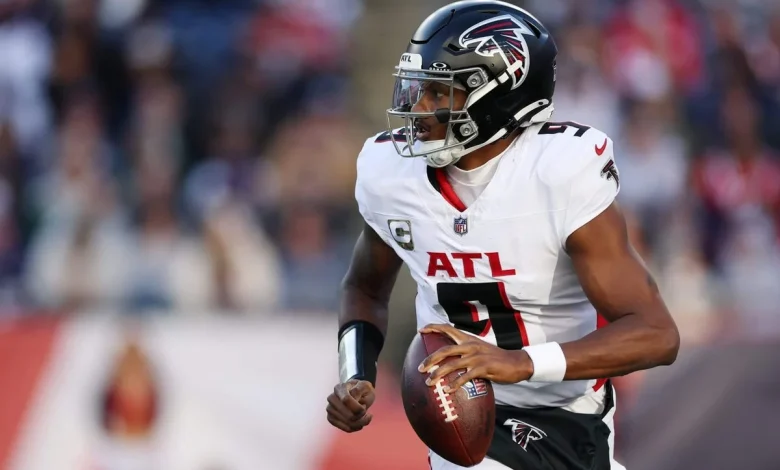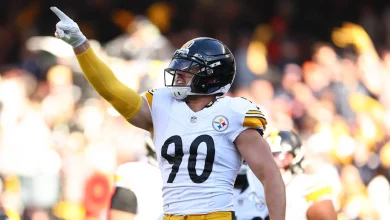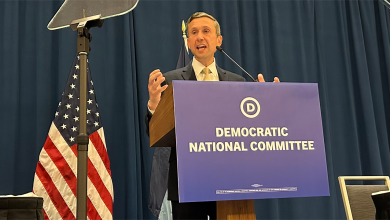Falcons at crossroads after lost season, Penix injury: ‘I just don’t think it’s going to work’

The Atlanta Falcons are in the midst of another lost season, but their most recent loss — a divisional defeat at the hands of the Carolina Panthers — exacted the steepest toll yet, potentially ending the season for second-year quarterback Michael Penix Jr.
The latest episode of “The Athletic Football Show” dives into Atlanta’s self-inflicted problems, as Robert Mays and Derrik Klassen look at the peculiar risks taken at the quarterback position and whether Penix’s first season as a starter answered any questions about what the next steps need to be if the Falcons hope to get out of neutral.
For much of the season, Penix played like a below-average quarterback. His skill set was limited and consistency eluded him, but his knee injury ended his season right as it was trending in a promising direction.
“There are still some throws that are not in his bag. There were certain modes of offense that I think they struggled to access because of it, like (targeting) the middle of the field, play action, things like that,” Klassen said. “Which actually is why I thought this game was a really brutal one for him to end on, because they actually were seeing a slight uptick in play action in this game. He was starting to make a couple of throws over the middle of the field. Then, he obviously goes out. That’s one game. Maybe that wasn’t gonna hold for the rest of the season — who knows — but the fact is he made some pretty decent plays in the last handful of games leading up to this one, whereas I think the first seven weeks of the season were pretty rocky.”
Penix’s injury was originally discussed as an ongoing issue with a bone bruise in his left knee, but there’s chatter that it could also be a partially torn ACL. This would be the third time Penix has had a season-ending ACL injury, though the two he suffered in college were in his right knee.
The problem is compounded by the fact that backup Kirk Cousins, to whom the Falcons paid an enormous sum of money last offseason, has looked abysmal in his appearances this year. It puts Atlanta in serious trouble, since their first-round quarterback, who they still don’t know enough about to bet on long-term, will likely miss at least some of next season recovering, and their wildly expensive backup is effectively unplayable. But, as Mays points out, it’s a hell of their own making.
Two offseasons ago, the Falcons signed Cousins to a four-year, $180 million contract, then promptly drafted Penix with the No. 8 pick. Cousins counts for $40 million against the cap this season and will be $35 million against the cap next season unless they cut him after June 1. However, whether it is between this year and next or between 2025, 2026 and 2027, Cousins will cost the Falcons $75 million against the cap for not being their starting quarterback. It was an expensive choice, made even more expensive by the decision to spend their top pick on a quarterback anyway.
“That was OK if Michael Penix was really good. That was kind of the refrain in the way that we talked about it. It was, ‘OK, I understand this is a lot. This is not an optimized commitment of resources, but if he ends up being good, the rest of that doesn’t matter.’ Well, we have no idea if he’s good, so there’s no clarity on that whatsoever. He’s not definitively good, and so on that front, I think you can absolutely take issue with how they’ve handled this,” Mays said, adding that the spending on Cousins negated the financial savings afforded them by having a quarterback on a rookie contract.
Then, in this year’s draft, Atlanta traded its 2026 first-round pick to the Los Angeles Rams to move up from pick No. 46 to pick No. 26, as well as getting pick No. 101. As it turns out, that jump from the early second round into the late first will end up being extremely expensive.
“If you look overall right now, the Falcons, as it currently stands after losing yesterday and going to 3-7, would be giving the eighth overall pick to the Rams in this draft. And that’s with Michael Penix’s play. We’ll see what happens with a handful of games of Kirk Cousins here, plus Drake London being hurt. This could get worse before it gets better,” Mays said.
It leaves the franchise in no-man’s land, caught between trying to find a solution with existing pieces and leaning into a full-on rebuild.
Head coach Raheem Morris is in his second season but hasn’t done anything to justify being fired outside of posting an ugly record while saddled with an incomplete roster and no available answers at quarterback. General manager Terry Fontenot, on the other hand, is in year five, and in addition to the disastrous choices of the last two years, he has never overseen a winning season. But firing just the GM makes things tough because the incoming candidates would likely want to hire their own coaches, not to mention hand-pick a quarterback. Year 2 feels early to cut bait on Penix, but with his injury history and performance thus far, committing to him long-term could only delay the inevitable.
“Do you fire the GM and then pair a new GM with this coaching staff? Or do you just completely clean house? Or are you sitting there being like, ‘What do we get if we fire the GM now?’ It just feels like there’s no right answer to how they should handle this offseason,” said Mays, adding that if Penix requires a long recovery from knee surgery, potentially another season will go by without answers under center.
“I know it feels risky given what they invested in Michael Penix, but I think they’re at the point where they should probably just clean slate,” Klassen said. “It does feel weird to do that when you’re only in year two of Raheem Morris, you haven’t actually seen very much of Michael Penix, and it is kind of a weird timeline. But to me, it does not feel like it’s going to work.”
Click here to listen to the full episode.





